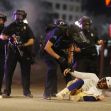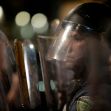On Monday, November 2, 2020, the Supreme Court of the United States vacated the Fifth Circuit Court’s decision that said a protest organizer could be sued for injuries inflicted by someone else during the protest. Justice Clarence Thomas dissented without a written explanation.
In response to the 2016 police officer-involved shooting of Alton Sterling in Baton Rouge, Louisiana, DeRay McKesson organized a Black Lives Matter protest. This protest took place in front of police headquarters on the highway. During the protest, a piece of concrete or rock was thrown by an unidentified person and hit an officer in the face, causing brain damage and other injuries.
After the incident, Officer Doe sought damages, claiming McKesson was negligent in the manner in which he staged the protest. Doe also alleged that the way McKesson staged the protest caused the assault. This claim was dismissed; the District Court stated that the claim was barred by the First Amendment.
The Fifth Circuit reversed the District Court’s decision, noting that Louisiana law usually doesn’t require its citizens to protect others from the criminal acts of a third party. But the majority of the Fifth Circuit court held that McKesson should have known that violence against the police would happen in a protest on a highway. The court held that this “knowing” amounted to negligence, as McKesson could be construed to have authorized or condoned the violence as a result of staging the protest.
Louisiana law prohibits highway blocking. The majority of the Fifth Circuit Court rejected the argument that Louisiana case law about blocked highways precluded liability unless McKenna intended violence to result. The Court found instead that the First Amendment didn’t prevent a liability claim as long as the injury was a result of activities that were directed, authorized or approved by McKesson.
The issue before the Supreme Court was whether this theory of personal liability violates the First Amendment. That Court stated that the constitutional question only arose if Louisiana law allowed McKesson to be found negligent for the actions of a third party in these circumstances. The Supreme Court vacated the Fifth Circuit decision, directing that court to ask the Louisiana Supreme Court for its opinion regarding the meaning of Louisiana law.
Under the Rules of the Louisiana Supreme Court, when there is no clear and controlling precedent for a case, the Federal Courts of Appeals may “certify” questions on their own, or at the motion of a party to the case. Though not often used, certification is wise prior to addressing a constitutional issue, the Supreme Court said. They also said that the Court of Appeals should have certified
1) whether the protest organizer/leader breached a duty of care, and
2) whether the injured officer’s allegations included a specific risk covered by that duty of care, if such duty existed.
The ACLU of Louisiana, via a press release on Nov. 2, said that if the Fifth Circuit’s decision was not overturned, the safeguards of the First Amendment regarding the right to protest would be impaired. They said that Officer Doe’s lawsuit against McKesson was a threat to everyone’s right to protest.
The NAACP filed a “friend of the court” brief, stating that civil disobedience has been one of the foundations of the social and political reforms we enjoy today. They also pointed out the Supreme Court’s role in preventing state laws from quelling civil-rights leaders. If the Fifth Circuit decision were left standing, it would signal to opponents of civil rights that they could use litigation to bankrupt and disrupt organizers and activists, preventing effective civil disobedience, the NAACP said.
In discussing certification by the Louisiana Court, the U.S. Supreme Court cited the need for state law judgment in precedential cases. The Court also noted that there are considerations for the Louisiana court before imposing a duty, including:
moral, social and economic factors
whether it’s fair to impose liability
the historical development of the precedent
the direction of the evolution of society and its institutions.
The Supreme Court also noted that since this area of law is so uncertain in Louisiana, the Fifth Circuit Court should have had the issue certified because of the value judgments and First Amendment implications. The certification would ensure that any conflict between state law and the First Amendment would not be hypothetical, but a genuine controversy. The case was remanded back to the Fifth Circuit Court of Appeals for further proceedings.
After the Supreme Court issued its decision, McKesson said, “I’ve been fighting this case for four years. Today’s decision recognizes that holding me liable for organizing a protest because an unidentifiable person threw a rock raises First Amendment concerns. I’m gratified that the Supreme Court vacated the ruling below, but amazingly, the fight is not over.”
The officer’s attorney was not available for comment on November 2.






